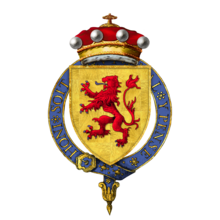Edward Cherleton, 5th Baron Cherleton
Edward Cherleton, 5th Baron Cherleton KG (also Charlton ; * around 1370, † March 14, 1421 ) was an English Marcher Lord . He is one of the Marcher Lords who played a major role in the suppression of the Owain Glyndŵr rebellion .
Origin and first marriage
Edward Cherleton was a younger son of John Cherleton, 3rd Baron Cherleton († 1374) and his wife Joan de Stafford, a daughter of Ralph de Stafford, 1st Earl of Stafford . Around June 1399 he married Alianore (also Eleanor ), the widow of Roger Mortimer, 4th Earl of March and daughter of Thomas Holland, 2nd Earl of Kent and Alice FitzAlan. She brought her Wittum , which included Usk Castle and Caerleon Castle in South Wales with the lordship belonging to it, into the marriage. When Henry Bolingbroke overthrew the previous King Richard II in the summer of 1399, a few weeks after the marriage of Cherleton and Alianore, he moved from Bristol to South Wales to plunder the property of Alianore, the daughter of one of his enemies. Cherleton managed to submit in time so that Usk and Caerleon were not sacked. He accompanied Bolingbroke when he pursued King Richard, who had fled to North Wales, via Chester . As a result, he became a confidante of Bolingbroke, who became Henry IV's new king. Cherleton's first wife died in childbirth on October 23, 1405 , but since Cherleton continued to be the guardian of Anne and Eleanor, their daughters from their first marriage, he was allowed to keep their Wittum until they came of age. Through the widow estates of his first wife, Cherleton had met the chronicler Adam of Usk from Usk . Adam of Usk lived for several years as a chaplain under Cherleton's protection in Welshpool, whereupon he praised him in his chronicle.
Role during the rebellion by Owain Glyndŵr
After the death of his older brother John , who had died childless in 1401, he inherited the Welsh rule Powys Wenwynwyn and the title of Baron Cherleton , which was confirmed to him on November 26th. By this time the Owain Glyndŵr rebellion had spread across much of Wales. As early as 1400, the rebels had sacked Welshpool , the center of Cherleton's rule. Cherleton lacked the necessary troops or finances, so that in 1402 its castles Usk and Caerleon were conquered by the rebels. While he was likely to regain ownership of the two towns by the next year, he urged the Welsh Marches Council to reinforce the meager crews of the Welsh castles. Since the council did not heed this request, it had to conclude its own truce with the rebels, which the council reluctantly approved. In June 1406 Cherleton defeated the Earl of Northumberland and Baron Bardolf who wanted to join the rebels with their troops. In November 1406 he obtained that the king pardoned his Welsh subjects who had submitted to him. The charter that Cherleton had granted Welshpool in June 1406, however, showed that he mistrusted many Welshmen. Around 1407 he was accepted into the Order of the Garter. Although the rebels around Owain Glyndŵr had suffered severe setbacks by this time, they were not yet defeated. Together with Siôn Trefor , Glyndŵr attacked the Cherleton estates in 1409, but none of its castles fell into the hands of the rebels. Eventually the rebellion collapsed over the next few years, and on March 10, 1414, Chaerleton was able to receive the surrender of numerous rebels at Bala , not far from the former manor of Owain Glyndŵr .
Arrest of John Oldcastle
In January 1414 the lollard and rebel Sir John Oldcastle fled to the Welsh Marches . The king offered a high reward for his capture, so that Cherleton finally began to actively pursue the rebel. In October 1417, a group of Cherleton's Welsh followers, led by Gruffudd Vaughan, managed to track down and overwhelm Oldcastle in 1417 on a remote farm on Cherleton's holdings. Oldcastle was initially imprisoned at Powis Castle before being taken to London for his sentencing and execution. In 1419 Cherleton was able to hand over their share of the reward to his Welsh followers.
Marriages and offspring
He had two daughters with his first wife, Alianore:
- Joan de Cherleton (around 1400–1425) ∞ John Gray, Earl of Tancarville
- Joyce de Cherleton (around 1403–1446) ∞ John Tiptoft, 1st Baron Tiptoft
After her death in 1405, before 1408, he married Elizabeth Berkeley , daughter of Sir John Berkeley of Beverstone , Gloucestershire . This marriage remained childless. Since he had no male offspring, his possessions were divided between his daughters after his death, and the title Baron Cherleton fell in Abeyance . His widow was second married to John Sutton, 1st Baron Dudley .
Web links
- Edward Cherleton, 5th Baron Cherleton on thepeerage.com , accessed February 21, 2016.
- Cracroft's Peerage: Cherleton, Baron (E, 1313-abeyant 1421)
- Ivor John Sanders: CHERLETON or CHARLTON Family , Dictionary of Welsh Biography, National Library of Wales
- TF Tout, RA Griffiths: Charlton, Edward, fifth Baron Charlton of Powys (1370-1421). In: Henry Colin Gray Matthew, Brian Harrison (Eds.): Oxford Dictionary of National Biography , from the earliest times to the year 2000 (ODNB). Oxford University Press, Oxford 2004, ISBN 0-19-861411-X , ( oxforddnb.com license required ), as of 2004
Individual evidence
- ^ Dictionary of Welsh Biography: CHERLETON or CHARLTON family. Retrieved May 21, 2016 .
| predecessor | Office | successor |
|---|---|---|
| John Cherleton |
Baron Cherleton 1401-1421 |
Title abeyant |
| personal data | |
|---|---|
| SURNAME | Cherleton, Edward, 5th Baron Cherleton |
| ALTERNATIVE NAMES | Charlton, Edward, 5th Baron Charlton of Powys |
| BRIEF DESCRIPTION | English Marcher Lord |
| DATE OF BIRTH | around 1370 |
| DATE OF DEATH | March 14, 1421 |
